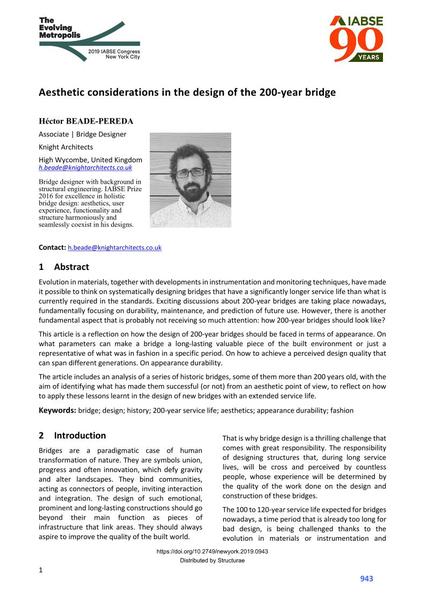Aesthetic considerations in the design of the 200-year bridge

|
|
|||||||||||
Détails bibliographiques
| Auteur(s): |
Héctor Beade-Pereda
|
||||
|---|---|---|---|---|---|
| Médium: | papier de conférence | ||||
| Langue(s): | anglais | ||||
| Conférence: | IABSE Congress: The Evolving Metropolis, New York, NY, USA, 4-6 September 2019 | ||||
| Publié dans: | The Evolving Metropolis | ||||
|
|||||
| Page(s): | 943-949 | ||||
| Nombre total de pages (du PDF): | 7 | ||||
| DOI: | 10.2749/newyork.2019.0943 | ||||
| Abstrait: |
Evolution in materials, together with developments in instrumentation and monitoring techniques, have made it possible to think on systematically designing bridges that have a significantly longer service life than what is currently required in the standards. Exciting discussions about 200-year bridges are taking place nowadays, fundamentally focusing on durability, maintenance, and prediction of future use. However, there is another fundamental aspect that is probably not receiving so much attention: how 200-year bridges should look like? This article is a reflection on how the design of 200-year bridges should be faced in terms of appearance. On what parameters can make a bridge a long-lasting valuable piece of the built environment or just a representative of what was in fashion in a specific period. On how to achieve a perceived design quality that can span different generations. On appearance durability. The article includes an analysis of a series of historic bridges, some of them more than 200 years old, with the aim of identifying what has made them successful (or not) from an aesthetic point of view, to reflect on how to apply these lessons learnt in the design of new bridges with an extended service life. |
||||
| Mots-clé: |
esthétique design pont histoire historie
|
||||
